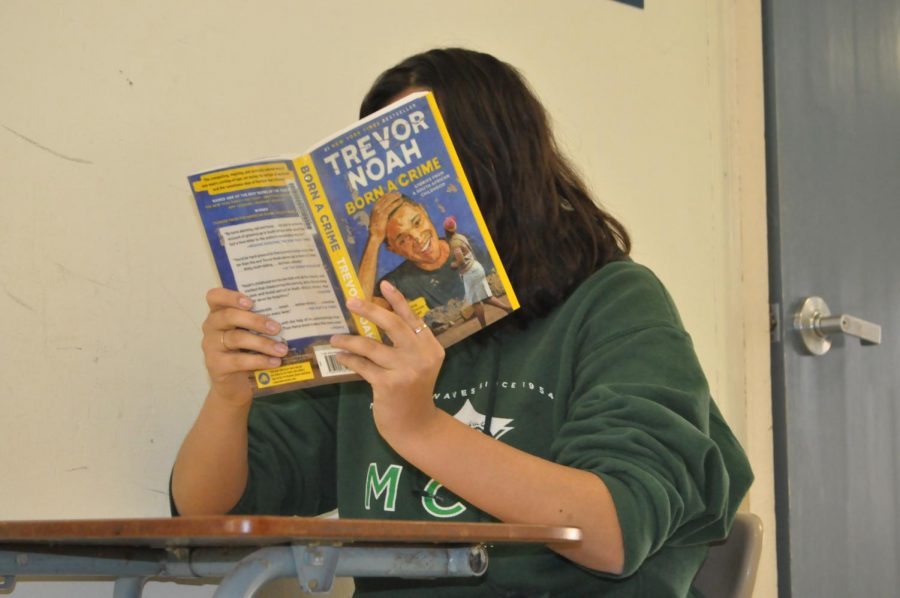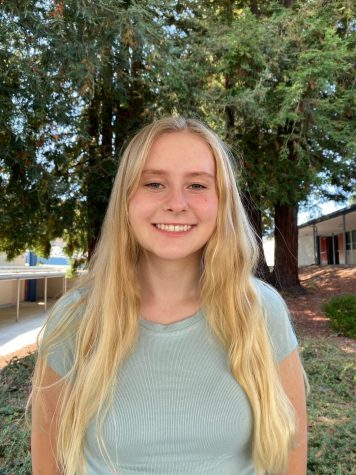New Text Offers Contemporary Consideration of Racism
November 7, 2019
As part of the English Department’s ongoing effort to offer more diverse perspectives, Born a Crime, the memoir by comedian Trevor Noah, is now part of the English II curriculum.
Noah depicts his childhood struggles living in South Africa during apartheid. As the son of a black Xhosa woman and white Swiss man, Noah’s birth was illegal. His parents could have been imprisoned for up to 5 years. Noah was essentially living proof of his parents indiscretion and was therefore kept indoors for most of his childhood, as any trace of his existence was forbidden by the government.
Born a Crime has been added to the supplemental reading list for Campolindo sophomores. Sophomore English teachers Jake Donohoe, Shannon Sieckert and Jamie Donohoe have each included it in their respective courses, and the response has been positive.
Sophomore April Mao calls it the “most important” book she has read in her high school English classes to date.
“I find it amazing that Noah is able to take a heavy topic such as apartheid and transform it into something digestible for everyday readers. Through comedy, Born a Crime becomes a novel not like some of the other textbook type books we’ve read this year,” said sophomore Olivia House.
Jamie Donohoe said the book is “incredible,” and his students have told him that it is “the best book that they have ever read.”
Sieckert noted that students admire the relationship between Noah and his mother, Patricia. Patricia was “loving and committed to offering him more than what she’d experienced, but she also wanted him to see all of what it meant to be South African so she stuck it out in ‘her country’,” said Sieckert.
“[The students] are responding to how language gave Noah a sense of agency that many people in his position did not have. He speaks about growing up, not fitting in, being made fun of, and every reader can relate to those feelings,” said Sieckert.
Unlike many of the classics taught in English, Born a Crime has been beneficial not only in teaching students about apartheid, which they may not cover in history class, but also in its confrontation with the racism that still exists in society today.
Mao has enjoyed the book’s autobiographical style as it is “more of a personal experience” compared to the “irrelevant dystopian societies” that she says sophomores usually read about.
According to House, learning about the history of racism may help prevent it in the future. “In order to know what to do in our future, we need to learn from our mistakes in the past,” said House.
“His story about growing up in apartheid is both an amazing story in itself but there are some reflections that we can do in our society. Listening to his story about apartheid there are some connections to be made. It’s good for the kids to explore that,” agreed Jamie Donohoe.
Sieckert said that the book is a “vital way to understand the level of insanity in the system of apartheid.”
“The book does a good job of illuminating how pervasive apartheid was in all parts of the lives of South Africans. All of this also presents opportunities to compare institutional racism in South Africa to historic and contemporary racism in the US,” said Sieckert.
While Sieckert sees value in teaching these morals to students, she is still adamant about what the “classics” have to offer.
Sieckert said, “There is a reason some books are classics, and when students get to university their professors will expect they’ve had exposure to said works. The hard part about analyzing literature is that the content may feel very disconnected from one’s own experiences. Student’s should have options, they should read independently, and be exposed to classic and contemporary voices.”
House hopes to see a “better balance between classics and new relevant books” in her high school English experience.
“Currently, the curriculum is very classic-heavy, which is an important genre, but newer books can be more relatable for students and provide us with a different view of our present rather than of our past,” said House.

